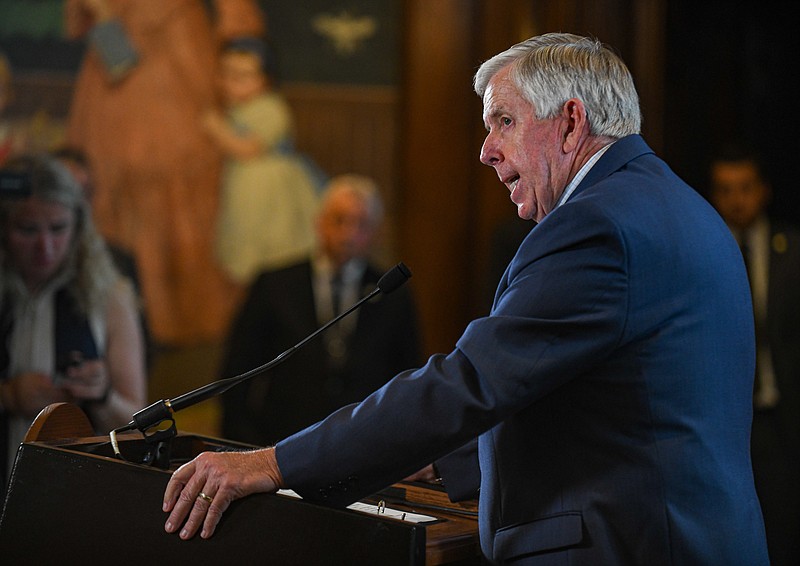Missouri Gov. Mike Parson defended his call for a substantial tax cut Tuesday as municipal leaders questioned its timing and the state's ability to afford it.
The Republican governor fielded a couple questions on what he's calling the largest tax cut in state history Tuesday morning on a conference call with municipal leaders from around the state. Parson announced details of the tax cut Monday in his official call for a special legislative session aimed at providing permanent tax relief and supporting the state's agricultural industry.
The first question, from an educator, asked Parson why he's focused on tax cuts rather than using state funds to improve teacher pay and further investments in education.
Missouri lags behind most states in educational funding.
The state auditor in 2021 found Missouri ranked No. 49 in K-12 funding, before the latest legislative session fully funded the state's foundation formula.
The state also ranked last in teacher pay before the General Assembly funded a matching program last session. The 70/30 voluntary match program provides districts the opportunity to raise base teacher pay from $25,000 to $38,000.
An estimated 141 school districts in the state -- more than 25 percent -- only offer classes four days per week, the Kansas City Star reports.
Parson said he's done more for public education in the past four years than any other Missouri governor, including leading the charge for increasing teacher pay and fully funding the foundation formula.
The second-term governor said there's still progress to be made on teacher pay and there will still be funding leftover after the tax cut to do it.
"There's going to be probably close to $400 million left for discretionary spending for new programs or teacher pay or whatever the legislative branch might be deciding to do," Parson said.
Another question asked about funding for infrastructure and if the state would still have funds to contribute to local projects.
Parson said infrastructure cost-share programs have been one of his priorities as governor, and MoDOT has funding to match the cost of local projects.
"There is a lot of money available out there," he said. "I would also tell you that water, sewer and things of that nature, there are several pools of money out there that definitely wasn't ARPA funding that you all can capitalize on and take advantage of."
Parson used the roughly 20-minute call to push back on claims the tax cut is unsustainable, the $700 million loss in revenue will mean cuts to state agencies and services, and that the state's record general revenue is based on a temporary influx of federal dollars.
"We will be able to absorb that and still have millions left over to be able to fund projects," he said of the tax cut. "The $700 million is probably a key number, we believe. We've been analyzing this for over a year to figure out what we can do and how we can maintain it."
The governor said the tax cut is conservative enough that the state will have resources to continue fully funding K-12 schools and education transportation, mental health services, broadband internet infrastructure developments, and road and bridge projects.
Childcare investments will also remain a priority despite the loss in revenue, Parson said.
"We don't have an opportunity to do this very often under the circumstances, but it's simply because the state has done extremely well and continues to grow," he said. "And that's good news for us, and we believe that we'll continue to grow as wages go up."

